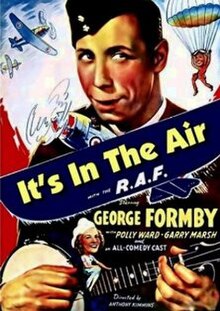It's in the Air
| It’s in the Air | |
|---|---|

UK film poster
|
|
| Directed by | Anthony Kimmins |
| Produced by |
Basil Dean Jack Kitchin |
| Written by | Anthony Kimmins |
| Starring |
George Formby Polly Ward Jack Hobbs |
| Music by | Ernest Irving |
| Cinematography |
Ronald Neame Gordon Dines |
| Edited by | Ernest Aldridge |
|
Production
company |
|
| Distributed by | Associated British |
|
Release date
|
|
|
Running time
|
87 minutes |
| Country | United Kingdom |
| Language | English |
It’s in the Air is a 1938 British comedy film directed by Anthony Kimmins and starring George Formby, Polly Ward and Jack Hobbs. The film was made at Ealing Studios. It was released in the United States with the alternative title George Takes the Air in 1940.
George Brown is rejected as an Air Raid Warden, and in doing so sees his potential to join the Royal Air Force. His dreams could soon come true as he realises that in fact his friend has left behind some very important papers. He dons his friend's Royal Air Force uniform and delivers the papers, whereupon he is mistaken for a dispatch driver from headquarters.
He soon becomes the butt of jokes from his sergeant which ends up with him staying indefinitely at the airfield. George soon falls in love with the Sergeant Major's daughter and when he discovers his real identity he threatens to report him.
On the day of an annual inspection George attempts to escape the base and ends up in a plane; while the inspector watches, George's aeroplane display is memorable and the inspector insists he should be commended in order to save their skins. George manages to land the plane and is accepted as a flyer by the RAF.
The film was partly made at the former London Air Park in Feltham, Middlesex. It is now a cinema and out of town shopping complex. After service as a fighter repair works and wartime aircraft factory during World War II, the air park closed down in 1946 to avoid air traffic conflicts with the new nearby Heathrow Airport. Feltham District Council purchased the park in 1956. The film's art direction is by Wilfred Shingleton.
The New York Times called it a "fast and crazy farce, typically British, typically slapstick. As a specimen of war-time culture it should not be overlooked."
...
Wikipedia
